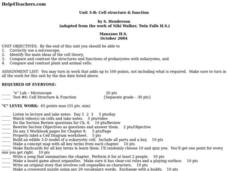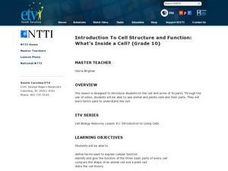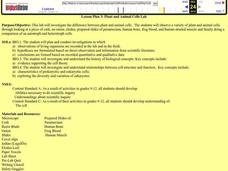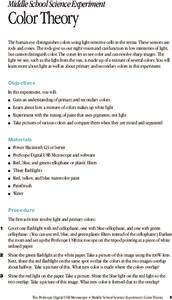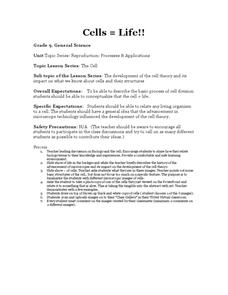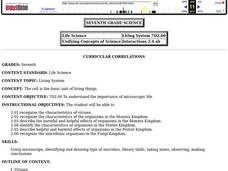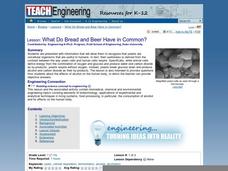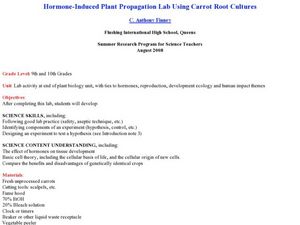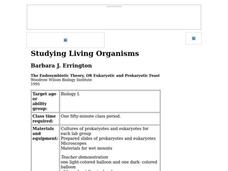Virginia Department of Education
The Cell Cycle and Mitosis
What a packed instructional activity! Provide your class with the opportunity to learn about the cell cycle in several exciting ways. Biologists first learn about the theory behind mitosis, then proceed to view onion tips under the...
Odell Education
Plant and Animal Cells
Incorporate multiple facets of the cell into your next high school lab! Through an introduction to cell organelles, class members observe each cell type and draw visuals to further demonstrate understanding of cellular processes in both...
Biology Corner
Cell Theory Rap
All that this will link you to is a rap about cell theory and organelles. Use it as an example for a creative assignment in your biology class. Divide the class into groups and assign them a topic for which they write and perform a skit,...
Curated OER
Animal and Plant Cell Journaling Activity
Jump into the classification of animal and plants cells, through this inviting lesson comparing Elodea leaves and Epithelial cells. Middle school learners will create wet mounts, write journal entries that compare specimens, and finally...
Curated OER
Lesson Plan: The Cell- A Historical Perspective
Students discover the impact the invention of the microscope had on scientific discovery as well as the concept of spontaneous generation and the cell theory. Students examine these scientific concepts through a WebQuest and by viewing a...
Pace University
Grade 6-8 Living Things
What characterizes a living thing? Scholars explore the concept during a differentiated instruction unit on living things. They perform lab experiments to determine how animals adapt to stimuli, watch videos and learn about...
Virginia Department of Education
Cell Division
Searching for simple ways to teach mitosis to high schoolers? Using colored chalk and onion root tips, pupils visually demonstrate what they view when looking through the lens of a microscope. There are also various ways to expand the...
Curated OER
Understanding Cells
Students identify and define several related vocabulary terms. Students complete a short lab and complete the questions. Students create a cell crossword puzzle and play cell computer games through the included links.
Curated OER
Cell Structure and Function
Students identify the main ideas of different cell theories. Using a microscope, they compare and contrast the structures and functions of prokaryotes and eukaryotes. They also compare and contrast animal and plant cells and complete...
Curated OER
The Human Cheek Cell
Students list the parts of cell theory and describe and define vocabulary. In this cell activity students complete a handout that includes sketching a cell.
Curated OER
Cell Theory, Plant And Animal Cell Comparison
Tenth graders study plant and animal cells. In this investigative lesson students draw their own animal cells and label them.
Curated OER
Introduction To Cell Structure and Function: What's Inside a Cell?
Tenth graders are introduced to the cell and some of its parts. Through the use of video, 10th graders see animal and plants cells and their parts. They learn terms used to explain the cell.
Curated OER
Plant and Animal Cells
Students investigate the difference between plant and animal cells. They observe a variety o plant and animals cells by looking at a piece of cork, an onion, elodea, prepared slides of paramecium, human bone, frog blood, and human...
Curated OER
Color Theory
Students are able to gain an understanding of primary and secondary colors. They are able to explore about how a mixture of colors makes up white light. Students are able to experiment with the mixing of paint that uses pigments, not...
Curated OER
Light Microscopes
Seventh graders study the parts of a light microscope, and its proper use. They identify each part and explain why it is important to know how to use this tool. They practice observing newsprint on a wet mount slide.
Curated OER
Cells=Life!
Ninth graders share what they know about cells. In this biology lesson, 9th graders study different microscopic images of the cell. They draw one and explain to their partner why they chose that image.
Curated OER
Cells
Seventh graders look up pictures of viruses or pictures of models of viruses. Using pipe cleaners, beads, Styrofoam or other available materials make models of these shapes. They then observe a demonstration to show the effect of Tobacco...
Curated OER
What Do Bread and Beer Have in Common?
Students listen to an explanation of yeast cells and how they effect bread and beer. They discuss the ways alcohol affects the human body and participate in an indirect observation about cell respiration in yeast-molasses cultures.
Curated OER
Studying Living Organisms
Students discover and discuss the differences between prokaryotes and eukaryotes. Using a microscope, they examine various prepared slides of prokaryotic and eukaryotic organisms.
Curated OER
Things Living in a Pond
Ninth graders observe, compare, and classify various microorganisms using a microscope. They answer discussion questions, and record their observations on a chart.
Curated OER
Transportation in Plants
Students investigate how plants transport water and nutrients through the plant. In this transportation in plants lesson plan, students use glass tubing, celery stalks, food coloring and leaves from plants to observe adhesion and...
Curated OER
Muscles
In this muscles worksheet, students describe characteristics of the three types of muscle and the function of each. Then they describe the gross and microscopic anatomy of skeletal muscle. Students also describe the steps that occur in a...
Curated OER
Hormone-Induced Plant Propagation Lab using Carrot Root Cultures
Students evaluate the importance of hormones in living things. In this biology lesson, students experiment on carrots to differentiate how humans and plants reproduce. They collect data from experiment to answer analysis questions.
Curated OER
Studying Living Organisms
High schoolers are introduced to Hardy-Weinberg Equilibrium without recourse to algebra. After participating in this activity, students gain a feeling for the significance of the Hardy-Weinberg Equilibrium without using algebra.










